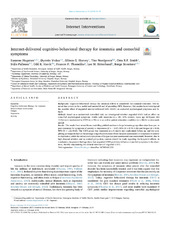Internet-delivered cognitive-behavioral therapy for insomnia and comorbid symptoms
Hagatun, Susanne; Vedaa, Øystein; Harvey, Allison G.; Nordgreen, Tine; Smith, Otto Robert Frans; Pallesen, Ståle; Havik, Odd E.; Thorndike, Frances P.; Ritterband, Lee M.; Sivertsen, Børge
Peer reviewed, Journal article
Published version

View/
Date
2018-06Metadata
Show full item recordCollections
Original version
https://doi.org/10.1016/j.invent.2018.02.003Abstract
Background: Cognitive-behavioral therapy for insomnia (CBTi) is considered the standard treatment. The internet has proven to be a useful and successful tool of providing CBTi. However, few studies have investigated the possible effect of unguided internet-delivered CBTi (ICBTi) on comorbid psychological symptoms and fatigue. Methods: Based on a randomized controlled trial, we investigated whether unguided ICBTi had an effect on comorbid psychological symptoms. Adults with insomnia (n = 181; 67% women; mean age 44.9 years [SD 13.0]) were randomized to ICBTi (n = 95) or to an online patient education condition (n = 86) for a nine-week period. Results: The results from mixed linear modelling yielded medium to large between-group effect sizes from pre- to post-treatment for symptoms of anxiety or depression(d = −0.57; 95% CI = 0.79–0.35) and fatigue (d = 0.92; 95% CI = 1.22–0.62). The ICBTi group was reassessed at a 6-month non-randomized follow-up, and the completing participants had on the average a significant increase (from the post-assessment) on symptoms of anxiety or depression, while the reduction in symptoms of fatigue (on post-assessment) was maintained. However, due to high dropout attrition and no control group data, caution should be made regarding the long-term effects. In conclusion, the present findings show that unguided ICBTi positively influence comorbid symptoms in the short-term, thereby emphasizing the clinical relevance of unguided ICBTi.
